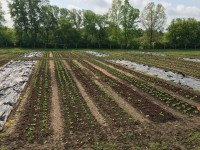Event Details
Date
Nov 2 - Nov 19, 2019
Location
Multiple Locations
Host
Cornell Vegetable ProgramTarping for Reduced Tillage Workshop
November 2 - November 19, 2019
The Cornell Small Farms Program is excited to announce a series of workshops on tarping for reduced tillage in small-scale vegetable systems, to be held in Maine and New York this fall. The Reduced Tillage (RT) project of the Cornell Small Farms Program supports farmers in adopting scale-appropriate RT practices that can lead to healthy, productive soils and greater profitability. Through the evaluation of novel tools and methods using systems-based field research and on-farm trials, the project helps farmers learn about the approaches that can work for their farm. This work is accomplished in collaboration with the University of Maine, and with support from Northeast SARE.
Tarping has emerged as a new practice for small farms — a tool being used to suppress weeds, manage soils, and reduce tillage. Join a full-day intensive farmer-to-farmer workshop to talk about how we can use tarps to advance reduced and no-till vegetable production. During the workshops we'll discuss tillage, weeds, and how to combine tarps with other soil building practices — like compost, mulches, and cover crops. You will learn from farmers as they share their successes and failures with tarps being used on their farm. You will also hear research results from five years of tarping trials in Maine and New York, which test no-till practices side-by-side with conventional management.
Join us and share your own tarping experiences and walk away with a plan to use tarps with less tillage on your farm. This is participatory workshop designed for farmers to learn from other farmers. Come prepared to dig-in, share your practices and struggles, and bring your questions as you consider adopting, changing, or expanding tarping practices on your farm.
We are offering this workshop at four different locations this November. Choose the site that works for you and register now, as space is limited.
This event is a pre-conference workshop hosted at the MOFGA Farmer to Farmer Conference, and will be held from 10 a.m. to 5 p.m. at the Point Lookout Resort and Conference Center. Register now on the F2F Conference website.
Monday, November 4, in Springvale, ME
This workshop will be held from 10 a.m. to 5 p.m. at the University of Maine Cooperative Extension in York County. Register now.
Monday, November 18, in Canandaigua, NY
This workshop will be held from 9 a.m. to 4 p.m. at the Cornell Cooperative Extension in Ontario County. Register now.
Tuesday, November 19, in Voorheesville, NY
This workshop will be held from 9 a.m. to 4 p.m. at the Cornell Cooperative Extension in Albany County. Register now.
Cost to participate is $35 per person with lunch and refreshments provided. Scholarships are available for active duty U.S. armed forces or military veterans in NY, covering up to $100 for travel costs and registration with support from the New York State Department of Agriculture and Markets. To apply, contact Dean Koyanagi at drk5@cornell.edu or (607) 255-9911.
For more information, visit: https://smallfarms.cornell.edu/2019/10/join-our-tarping-for-reduced-tillage-workshop-series/
Tarping Series Flyer (PDF; 1718KB)



































